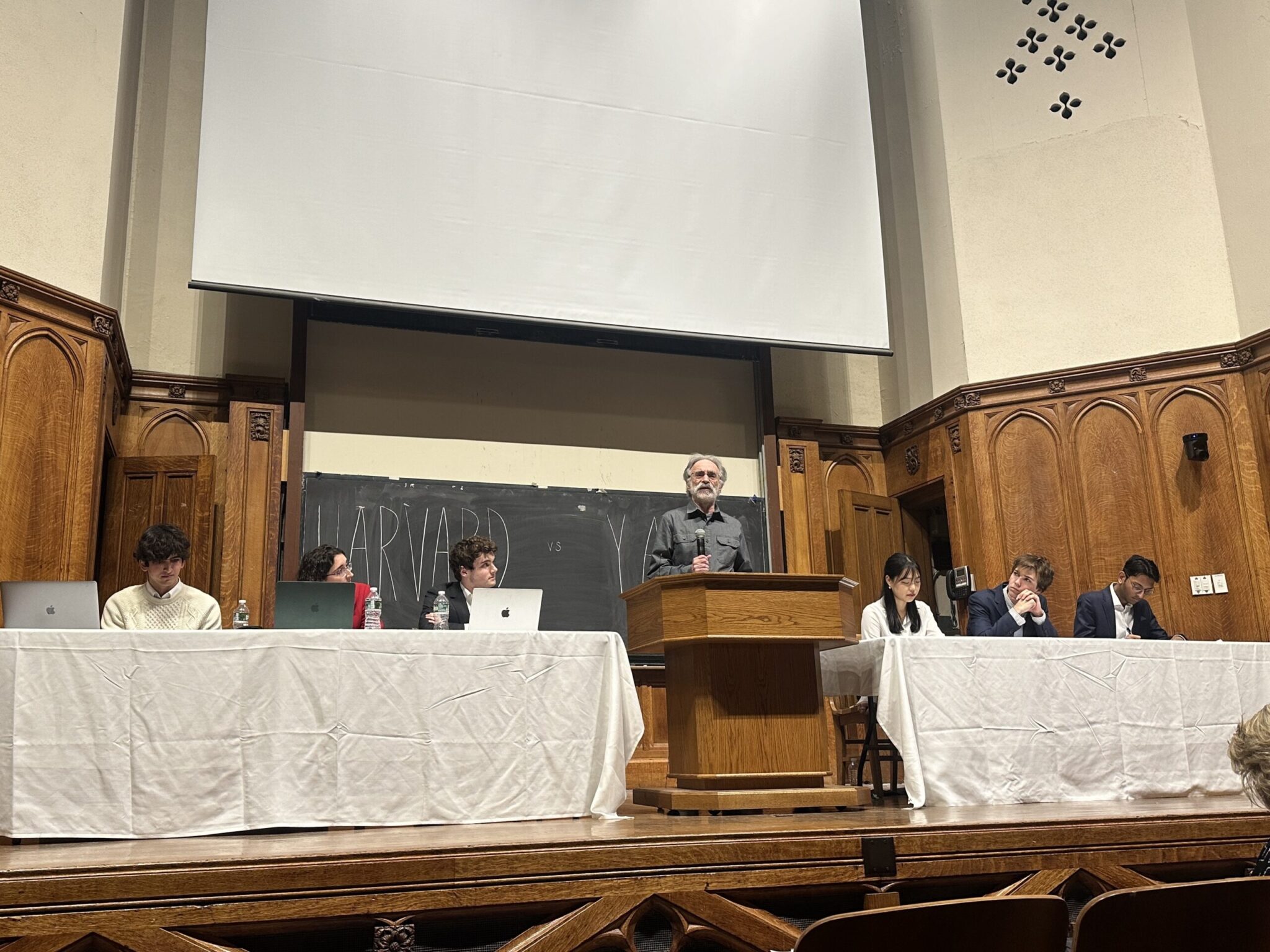‘An event around the truth’: Yale and Harvard debate the use of AI in creative fields
On Saturday, debate groups from Yale and Harvard discussed the opposing and supporting sides of artificial intelligence technologies in creative and art fields. Harvard came out on top.

Karla Cortes, Contributing Photographer
The Yale Debate Association hosted the Harvard College Debating Union for a debate over artificial intelligence in the arts on Saturday.
Shelly Kagan, a philosophy professor, opened the event with a keynote speech discussing his experience using ChatGPT to interpret philosophy. Through active audience participation and logic puzzles, Kagan talked about the tests he has performed on ChatGPT, making the audience guess which essays were written by the AI tool.
“It sounded like philosophy, it had the air of philosophy … But it was just kind of empty nothingness,” Kagan said.
The YDA’s team opened the debate on the side opposing AI use in the arts, with Harvard’s team taking the supporting side, during three rounds of speeches and audience questions. Both schools referred to the recent SAG-AFTRA strike, Pixar animations and the use of DALL-E in their arguments on both sides.
Yale’s team included Lauren Cho ’26, Ryan Gumlia ’26 and Anish Beeram ’27, and Harvard’s team included Sam Jones, Julia Shepard and Theo Datta. The debate was judged by Kagan, dean of the Faculty of Arts and Sciences Tamar Gendler and Judge Karen Goodrow of the Connecticut Superior Court.
Cho kicked off the debate for Yale on the anti-AI side, making note of the long and short-term consequences of AI in the arts while referring to current events.
She argued that AI corrupts the purpose and value of art — instead, churning out a “mechanical reproduction.”
“AI is no tool,” she said. “AI predates on human creativity.”
After Cho closed her argument, Jones started the Harvard pro-AI side’s speech by discussing the benefits of using AI to assist humans in making art.
While he acknowledged the opposing side’s argument toward worker exploitation when AI creates tension and competition between workers, he argued that AI is just another medium of art.
“Art is by and for humans, and AI does not change that.”
Jones noted that the use of AI will create accessibility to those previously barred from creating art, such as disabled artists.
“Most prominent art forms require high levels of motor control, pushing out artists with physical disabilities,” he said. “Artists using generative AI can create complex and visually appealing works by inputting creative prompts.”
To deconstruct Harvard’s argument, Gumlia asserted that AI is not simply a tool — that instead of assisting, it tries to be an artist of its own, creating low-quality pieces of art.
To challenge Yale’s argument that AI would lead to a saturation of artwork, Harvard’s Shepard argued that the consumer market would not become overcrowded to the point of no diversity or choice to consume by humans. Even with higher amounts of art available with the rise of AI, Harvard’s team argued, observers of art can decide what narrative to consume.
To close out the debate, Beeram and Datta each dissected the opposing team’s arguments. Beeram noted the “full contradictance” of Harvard’s argument about increasing inaccessibility, noting the lack of diversity in the tech industry designing these AI tools. Despite this, Datta reinforced that instead of restricting, AI would make the art field’s “floodgates open.”
The end of the debate was met by applause from the audience, and after the debate, the panel of judges deliberated in a separate room. Kagan returned to the stage to summarize the panel’s divided thoughts, declaring Harvard the winner of the debate.
The YDA, the organizers of this event, emphasized the importance of debates not only for the intellectual growth of the students debating but also for the audience members.
Unlike the YDA’s typical debates, this debate involved active audience participation, where the audience was able to ask questions of each team after their opening arguments.
“Events like these are different because we are trying to put all the ideas on the table for the audience to consider,” Ely Altman ’25, YDA president, said.
After the event, audience members stated that the debate provided them with a fresh perspective on the emergent issue from both Harvard and Yale.
Members of the Harvard team said they appreciated the format of this debate, unique compared to the usual debate styles they use — this format incentivizes deeper research into the debate topic, according to Jones.
The Yale Debate Association was established in 1908.







